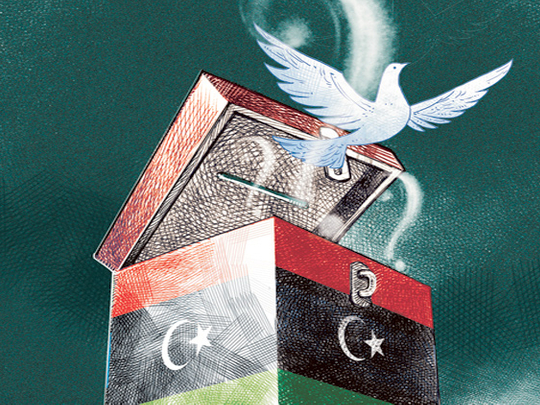
Last week, Libya held its second general elections in less than two years. The election is seen as a last chance to end the anarchy that has gripped the country since the removal of the Gaddafi regime in 2011. The new parliament will replace the General National Congress, a body that was elected to lead the transitional period, draft the constitution and pave the way for the election of a more stable government. Yet, the very political entity that was entrusted with these key tasks became riddled with controversy, political deadlock and the ideological battles. In fact, since the General National Congress elections in July 2012, the country has lurched from one crisis to another in a conflict pitting the two largest political blocs against one another — namely the Muslim Brotherhood with their independent allies and the Alliance of National Forces, led by Mahmoud Jibril.
The National Congress, and the interim government it established, faced structural challenges that were reflected in the utter absence of a state with functioning institutions, as well as any form of political life or vision of how the transitional period should be managed. This situation was aggravated when attempts to disarm the militias and integrate them into an inclusive national army failed. To make matters worse, the General National Congress itself faced a crisis over the renewal of its mandate as it had exceeded the time-frame set out by the Constitutional Declaration, without having completed the drafting of the constitution.
This failure further weakened what was the only democratically elected authority in the country, diminishing its popularity and allowing other forces that had been sidelined by the fall of Muammar Gaddafi to come forward and present themselves as an alternative source for salvation. General Khalifa Haftar’s recent attempt was perhaps the most important in this direction so far. Haftar’s forces are composed mainly of remnants of the former Libyan army. He is supported by the federalists — those who call for a federal state — and the National Forces Alliance led by former prime minister Mahmoud Jibril. The tribes of Rashfana, Tarhouna, Warfalah and the city of Zliten in the west of Libya have also announced their support for Haftar. Some Libyan intelligence agencies, commando forces, and air defence units have also joined Haftar’s forces, thereby giving him relative edge over his opponents, with more regular troops enlisted and the broadest net of allies, particularly in the western region. Haftar and his allies are challenging the legitimacy of the National Congress and the transitional government, both are supported by the Benghazi Brigades, the tribes of the Nafusa Mountains and Misrata. Amidst this polarisation, the election is seen as an avenue to turn the tide against the very probability of a full-scale civil war.
So far, the fighting is limited to areas in the east, but could easily erupt on a widespread basis; it could engulf Misrata, in addition to Benghazi, and embroil powerful enmities in Bani Walid, Tarhouna and neighbouring Zliten. Fighting could also erupt in the west in the Nafusa Mountains, especially between Zintan on one hand and Nalut and Ifrane on the other. Should matters deteriorate in this fashion, the warfare will be devastating, with each side attempting to annihilate the other.
Although unlikely, but if the conflict engulfs Libya, regional powers, such as Egypt and Algeria may get tempted to intervene. If this were to occur, the situation would only become more complicated, with the possible spread of violence to the neighbouring countries. In any case, Libya today is at a dangerous crossroads. If the situation is not remedied through dialogue, national consensus-building, and a completion of the democratic transition based upon popular will, expressed peacefully through the ballot box, then it is likely that the country will enter into a state of armed conflict that will engulf the entire country or large parts of it with consequences that could only be more than the word “catastrophic” could ever hint at.
For now, one can hope that the reluctance of the western part of the country to get involved in the fighting may keep the clashes limited to the east, but that may not last for long. The confrontation that is now confined to the Benghazi Brigades and general Haftar’s forces could turn into street-fighting, rallying fighters from all over the country. Haftar will seek support from his allies in the west as well as from Libya’s regional neighbours. Benghazi could appeal for help from its allies in the Nafusa Mountains and the powerful Ali Hassan Al Jaber Brigade in Al Baida city.
Indeed, the new elections could act as a fresh start, but for that to occur, the political and armed groups must stop seeking to either overrule or outgun each other. Rather, they must start thinking in terms of a compromise where everyone can have a share in a new political formula.
Dr Marwan Kabalan is a Syrian academic and writer.










